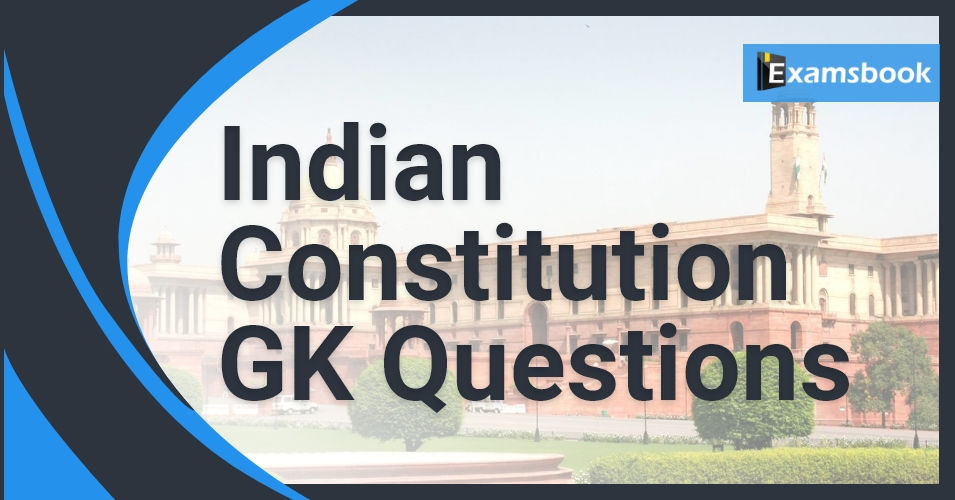Indian Constitution Questions and Answers for Competitive Exams

How many fundamental duties of Indian citizens are there in the Indian Constitution, as of March 2022?
(A) 5
(B) 11
(C) 9
(D) 3
Correct Answer : B
Explanation :
As of my last update in September 2021, there are 11 fundamental duties of Indian citizens mentioned in the Indian Constitution. These duties were added by the 42nd Amendment Act in 1976. However, it's important to verify with up-to-date legal sources because constitutional amendments can occur, potentially changing the number or content of these duties after my last update.
The feature of Fundamental Rights in the Indian Constitution is borrowed from the Constitution of _______.
(A) Australia
(B) Britain
(C) Ireland
(D) United States of America
Correct Answer : D
Explanation :
The feature of Fundamental Rights in the Indian Constitution is borrowed from the Constitution of the United States of America. The Fundamental Rights in the Indian Constitution, as outlined in Part III (Article 12 to 35), are similar to the Bill of Rights in the U.S. Constitution.
The state legislative assembly has a strength of ____, with exceptions for smaller states.
(A) 600 to 1000
(B) 60 to 500
(C) 50 to 400
(D) 10 to 100
Correct Answer : B
Explanation :
The state legislative assembly in India has a strength of 60 to 500 members, with exceptions for smaller states. The number of members varies from state to state based on their population.
Which article of Indian constitution deals with discrimination against any Indian citizen on various grounds?
(A) Article 11
(B) Article 19
(C) Article 13
(D) Article 15
Correct Answer : D
Explanation :
Article 15 of the Indian Constitution deals with the prohibition of discrimination against any citizen on grounds of religion, race, caste, sex or place of birth. It states that the State shall not discriminate against any citizen on grounds only of religion, race, caste, sex, or place of birth.
Which Article of the Indian Constitution empowers a High Court to issue writs for the enforcement of the Fundamental Rights of the citizens?
(A) Article 226
(B) Article 242
(C) Article 230
(D) Article 235
Correct Answer : A
Explanation :
Article 226 of the Indian Constitution empowers High Courts in India to issue writs, including habeas corpus, mandamus, prohibition, quo warranto, and certiorari, for the enforcement of the fundamental rights of the citizens as well as for any other purpose. This article grants the High Courts the power to protect and enforce fundamental rights in their respective states.
The Supreme Court on 18 July, 2022 ordered its registry to work out a mechanism to remove personal details of persons entangled in matrimonial litigation. This decision was taken to recognize which right as part of ‘right to privacy’?
(A) Right to division of power
(B) Right to live
(C) Right to be forgotten
(D) Right to practice religion
Correct Answer : C
Explanation :
The Supreme Court's decision to remove personal details of individuals involved in matrimonial litigation is related to the concept of "Right to be forgotten," which is a part of the right to privacy. This right allows individuals to request the removal of their personal information from online platforms and other records if that information is outdated or no longer relevant, preserving their privacy and dignity.
India is a republic because
(A) It is democratic country
(B) It is a parliamentary democracy
(C) the head of the state is elected for a definite period
(D) All of these
Correct Answer : C
Explanation :
India is a republic because the head of the state, the President, is elected by an electoral college for a fixed term of five years. This democratic process ensures that the highest office in the country is not hereditary but held through periodic elections, reflecting the nation's commitment to representative governance and equality.
What is the basis of classification of governments as unitary and federal?
(A) Relationship between legislature and executive
(B) Relationship between executive and judiciary
(C) Relationship between the Centre and States
(D) Relationship between the legislature, executive and judicial wings of government
Correct Answer : C
Explanation :
Governments are classified as unitary or federal based on the distribution of power between the central and regional authorities. In a unitary system, all power is concentrated in the central government. In federal systems, power is shared between central and regional governments, each having distinct spheres of authority.
Statement I: The Constitution of India is a liberal Constitution
Statement II: It provides Fundamental Rights to Individuals
(A) Both the statement are individually true and statement II is the correct explanation of statement
(B) Both the statements are individually true but statement II is not the correct explanation of statement
(C) Statement I is true but statement II is false
(D) Statement I is false but statement II is true
Correct Answer : A
Explanation :
both statements are individually true, and statement II is the correct explanation of statement I. The Constitution of India is indeed a liberal Constitution, emphasizing democratic values, individual rights, and freedoms. Statement II clarifies that it achieves this liberal character by providing Fundamental Rights to individuals, which are essential elements of a liberal democratic framework, ensuring citizens' liberties and equal protection under the law.
What is the status of the Right to Property now?
(A) Legal Right
(B) Human Right
(C) Fundamental Right
(D) Natural Right
Correct Answer : A
Explanation :
The Right to Property in India is recognized as a legal right under Article 300-A of the Indian Constitution. It means that individuals have the right to own and use property, and they cannot be deprived of their property except by authority of law. However, it is no longer a fundamental right, which means that the government can impose reasonable restrictions on property ownership. While individuals have legal protection for their property, it is subject to certain limitations defined by law.



